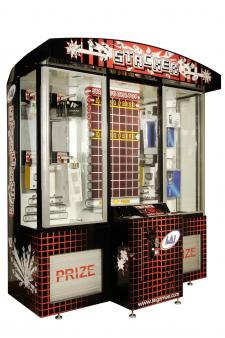LAI has become a world leader in the coin-op amusement industry and 2008 sees the group celebrate its 50th anniversary. Helen Fletcher talks past, present and future with chief executive officer Alan Freimuth

ESTABLISHED by Malcolm Steinberg in 1958, in Perth, Western Australia, LAI began life when he bought a number of pinball games from his uncle who was involved in Australia’s eastern states coin-op business.
Steinberg located the pinballs in sites around Perth, Australia, and the operation business was born. The next two decades saw LAI build pool tables for the coin-op and home market and then video games and pinballs under licences from companies such as Atari, Taito, Sega, Namco and Stern Pinball.
Then, in the late 90s, the company started developing and licensing some of its games to major US manufacturers and in early 2000the group began to market its products under its own label, LAI Games, initially in the US, UK and mainland Europe.
International operations
Today the LAI Group employs over 2,000 people and exports to 26 countries. The operation side of the business has also continued to grow and could be considered one of the group’s biggest achievements. LAI now operates in Australia, New Zealand, Singapore, the Philippines, Indonesia and India through the Timezone FEC brand.
“Having operational experience in our group helps us to understand the players,” said CEO Alan Freimuth. “Also, operating in western and Asian markets gives us a good head start in our game development department. Having access to our own FEC locations also helps greatly with our initial testing and fine-tuning of a new product.
“Through the growth of the FEC operation, which is now 200 strong, came the development of a new product and in turn anew company. The Embed debit card system was initially developed for use in LAI’s own operations but the group soon saw the requests flood in to make the system available to the general market.
“It was seen as the perfect system to manage an FEC business,” said Freimuth. “So a separate company was established by Adam Steinberg (son of Malcolm) in the late90s - today Embed has offices in the US, Middle East and Australia.
”LAI, it would seem, has many strings to its bow as it also has a software division –Matahari Studio, which not only develops the company’s games but also provides contract work in the development of computer games to major art studios such as EA Games and Nintendo.
Stack ‘em up
But it is the research and development team, headed up by Chris McGrath and Damien Wiseman, that have really put the group on the map internationally, developing prize vending games such as Timebuster, Lighthouse and Stacker, which has undoubtedly been the company’s biggest success story.
“We have sold over 12,000 Stacker units so far and it is still going strong,” said Freimuth. “It is the ideal replacement for the ailing crane locations that are tired of plush and therefore under perform - there are literally thousands of them out there.
“Operators have recognised that these locations are good; it is just that they need a change off prize and game play. The Stacker has been the answer and income has more than quadrupled in most cases.
“Having been around for no less than half a century, the company has undoubtedly seen changes in the coin-op amusement industry. The sector was really buzzing in the Space Invader, Pac Man and Daytona days –around the early 80s to the mid 90s and according to Freimuth, at that time there were a lot of entrepreneurs getting into the industry, who then became operators.
“The unfortunate trend is that today’s entrepreneurs don’t even look at the coin-op industry so there is no natural progression to take over the bat when existing operators retire,” he said. “Also our industry, which used to be the leader in low cost out of home entertainment for teenagers and was dominated by games with a joystick and a few buttons, has taken a big hit with the evolution of the home console market. Today video games are released into the home market before they are made into coin-op games.
Changing trends
“LAI recognised that trend in the 90s and we focused our effort on a segment of the market that does not compete with the home market and that is ticket redemption and prize vending games,” continued Freimuth.
“The original video game arcade is finding it hard today to stay ahead of the times; you constantly need to reinvest in new expensive products to satisfy the dedicated gamer whereas ticket games and prize vending games have much broader appeal and as long you keep the prizes fresh and desirable these games produce good income for years on end.”
Although LAI Games products are currently being distributed in a number of international countries, the group recently decided it wanted a partner that could further service the market in some European countries including eastern Europe and so it formed a distribution partnership with Austrian-based Funworld.
“Europe is landlocked,” said Freimuth. “Having 15 distributors in 15 countries that are a few hours’ drive from each other doesn’t make a lot of sense. Funworld already has an established distribution network and it works for us to deal with a large company that has the infrastructure to market and service our products."
And as for the future of LAI – will we be seeing another 50 years from this manufacturer and operator and if so, how will the group do it? “This business survives on innovation,” said Freimuth. “As a manufacturer we need to bring good games to market. Operators are fussy and only want to buy the best available, so there is not much room for mediocrity. We spend over $2m each year in research and development in an effort to meet operators’ expectations.”
LAI Games plans to release new titles at IAAPA in November and in January at ATEI.

